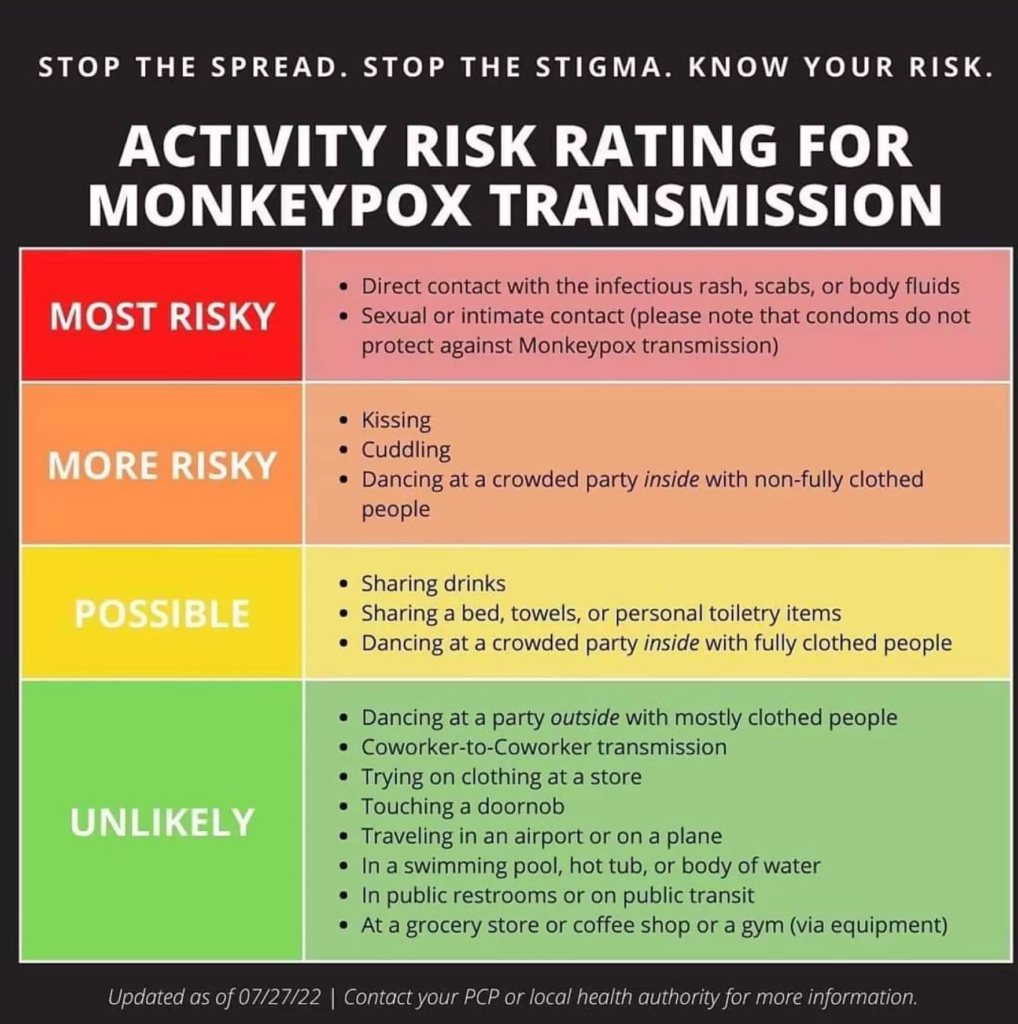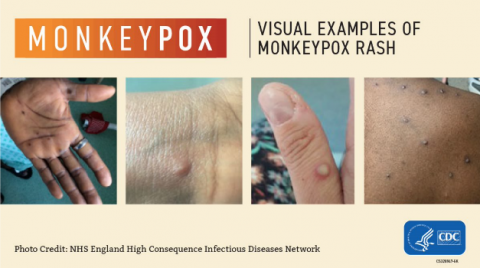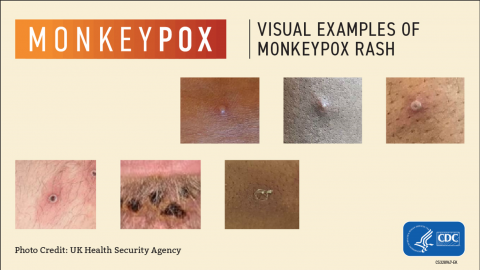What is Mpox?
Mpox (also known as Monkeypox or MPX) is a viral illness that was first documented in 1958 among research monkeys (hence, the name), and in 1970, cases among humans were discovered in the Democratic Republic of Congo and were concentrated in Central and West African countries. In May 2022 cases started appearing in the U.S. and in Minnesota. Thousands of people in the U.S. have been infected since then. Case counts began to decrease in fall of 2022 and have come back in summer of 2023. The illness itself typically lasts for an average of 21 days and then infected people recover, most often without treatment.
How is Mpox Spread?

Mpox is most often passed from person to person by having sustained contact with an infected person’s rash/sores/lesions. This may happen while cuddling, kissing, having sex, or massaging someone. People are contagious as long as the lesions are not healed (scabs must be completely healed with new skin to no longer be contagious). Someone may also get Mpox by coming into contact with items used by a person with Mpox, especially porous materials like fabrics, clothing, bed sheets, hand towels, and linens. However, this is far less likely to spread Mpox. When handling such materials do not shake them, it can cause Mpox to be disseminated in the air.
Signs and Symptoms


Mpox is characterized by a new rash that develops into either one lesion or multiple lesions that are hard and pus/fluid-filled. It is most often seen as a pimple or small boil that has a dark dot in the center, but may look different depending on the individual and how long they have had it. Mpox has often been seen as a “domed up Cheerio” – or a white pustule that looks like a ring with a dent in the center. The lesions then form a black scab that falls off and new skin heals over. About half of the time, skin conditions caused by Mpox such as rashes and lesions are accompanied by flu-like symptoms. Individuals with Mpox may experience fever, chills, muscle aches, swollen lymph nodes, and nausea. Pain may be associated with lesions especially when in more sensitive places such as the mouth, genital, and rectal area. Certain medications and home remedies are available to lessen symptoms.
Who Can Get Mpox?
Anyone can get Mpox if they are exposed, regardless of sexual orientation, gender identity, age, or race. We are seeing men who have sex with men as the majority of cases but Mpox has been documented among women and heterosexual men as well. We have seen that people who have been vaccinated can also still get Mpox, although they may have less severe symptoms because of the vaccine.
If I Am Experiencing Symptoms What Should I Do?
- Begin taking precautions as soon as you suspect you may have Monkeypox. Avoid having sex, cuddling, and generally avoid having people come into contact with your sores.
- Cover your lesions with bandaids or clothing. If you are in pain or need to tips for managing symptoms visit our home care page.
- Find testing as soon as possible at your nearest public health clinic, primary care provider, or sexual health clinic. Call ahead and tell them you may be having symptoms of Monkeypox and would like testing. If you would like assistance with making that call please email us at info@mplspox.com or call or text us at: 612-424-2231.
- Document your symptoms by taking photos, noting when you first showed symptoms, and keeping track of what symptoms you are experiencing.
- If you have flu-like symptoms or sores on visible places like your hands and arms, you can ask for a note from your provider for work or school indicating that you are being evaluated for a viral illness. Note that an Mpox infection can take as long as 3 weeks to completely heal. If you need assistance with notifying your workplace let us know.
What If I Was Exposed To Mpox?
If you are experiencing symptoms of Mpox after being exposed, get tested as soon as possible and isolate. People who have come into contact with Mpox should monitor symptoms for up to 21 days after exposure.
If you do not have symptoms you can continue daily activities and do not have to isolate. Being vaccinated is a way to prevent Mpox by up to 85%. See our vaccination calculator to find on what date you will receive maximum immunity. If you are exposed to Mpox and receive the vaccine within 4 days, there is a lower chance of transmission. If you are vaccinated 4-14 days after exposure, it may not prevent transmission but it can reduce symptoms of mpox. It is still possible to get Mpox after your first and your second dose so continue to take precautions even if vaccinated.
How Do I Prevent Mpox?
General Prevention and Harm Reduction
- Get vaccinated
- Wash your hands frequently or use an alcohol-based hand sanitizer
- Disinfect surfaces touched by someone with uncovered Mpox lesions.
- Do not handle towels, bedding, or clothing used by someone with Mpox.
- Do not share eating utensils or food with someone diagnosed with Mpox.
Sexual Health Based Prevention and Harm Reduction
- Hold off on having sex or close contact (kissing, cuddling, hugging) if you are feeling ill and/or have a rash. Encourage sex partners and friends to do the same. Phone sex/sexting is a great alternative.
- If you do have sex with someone who has Mpox, have them cover lesions with bandaids or clothing; use condoms and dental dams as ways to cover genital and rectal lesions.
- Do not douche while having rectal lesions. Douching while having rectal lesions can transmit Mpox further up the GI tract.
- Swap contact info with partners so you can notify each other if one of you tests positive for Mpox.
- Masturbating in the same room while not touching the other person can be an effective way of preventing transmission.
- Wash your hands, sex toys, bedding, and towels after having sex.
Visit our resources page for more harm reduction resources!
